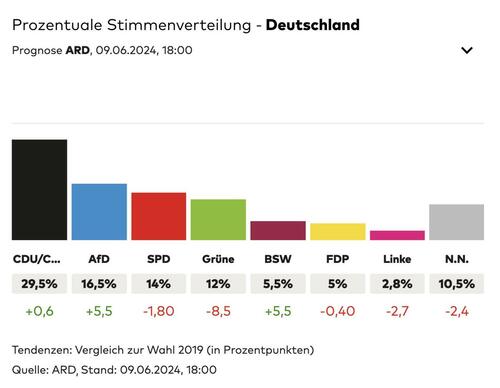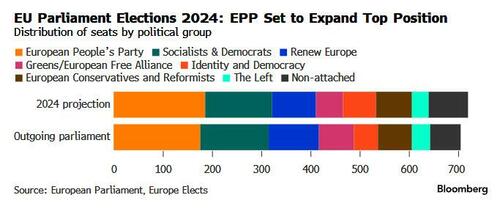
Update (4:20pm ET):
Following a historic loss to Marine Le Pen’s right-wing party in European elections on Sunday, French President Emmanuel Macron said he is dissolving the French parliament.
Macron said France will hold new elections on June 30 and July 7, a high-stakes maneuver that the WSJ said "stunned" the nation after projections based on early ballot counts came in for Sunday’s elections for the European Parliament. The projections showed National Rally garnering around 31% of the vote, twice the support for Macron’s Renew Party.
Bardella and Le Pen humiliate Macron in European elections. Macron dissolves National Assembly and calls new elections in a month. pic.twitter.com/oSDnUjl5EJ
— RadioGenoa (@RadioGenoa) June 9, 2024
“This is a serious, weighty decision, but above all it’s an act of trust,” Macron said. “Confidence in you, confidence in the ability of the French people to make the right choice for themselves and for future generations.”
Bardella and Le Pen humiliate Macron in European elections. Macron dissolves National Assembly and calls new elections in a month. Putin laughs. https://t.co/gulU3Tbp05 pic.twitter.com/2bfcqf0ctL
— RadioGenoa (@RadioGenoa) June 9, 2024
Macron’s decision to call parliamentary elections opens the door for his party, which is deeply unpopular at the moment, to shed even more seats to rival parties in France’s National Assembly, the country’s lower house of Parliament.
If that occurs, Macron could be forced to appoint a prime minister from another party, such as the center-right Les Républicains, in a power-sharing arrangement known in France as a “cohabitation.”
“A dissolution means a cohabitation,” said Alain Duhamel, a prominent political analyst.
* * *
As we await the results from the European Parliament vote (previewed here), the exit polls from Germany are already in and they are a disaster for both the alliance of French president Macron, who was steamrolled by Marine Le Pen, and for German Chancellor Olaf Scholz’s Social Democrats, which crashed to their worst-ever result in European Parliament elections Sunday, as conservative and right-wing parties soared across the old continent, a result which will help tilt the European parliament further towards a more anti-immigration and anti-green stance.
According to preliminary results from five countries, right-wing parties are estimated to have won at least 33 of the 174 seats available in Austria, Cyprus, Germany, Greece and the Netherlands, according to official exit polls from those countries, up from 19 seats at the last election in 2019. And - as the ultraliberal FT admits - "the surge, at the expense of liberal and Green parties, would complicate European commission president Ursula von der Leyen’s bid for a second term as head of the EU’s executive."
In Germany, Chancellor Scholz’s Social Democrats crashed to their worst-ever result, falling to third place with 14% of the vote behind the populist and nationalist Alternative for Germany, which has become the second-largest German party in the European Parliament with 16.4%. The conservative CDU/CSU alliance was on course for a comfortable win with 29.6%, according to an exit poll Sunday from public broadcaster ARD. The other two parties in Scholz’s ruling alliance — the Greens and the Free Democrats — got 12% and 5% respectively.
As reported overnight, the German exit polls are among the first results from the European election, which started Thursday and culminates Sunday, and will determine the make-up of the bloc’s legislative assembly. The outcome will establish which leaders have the most leverage to claim the EU’s top jobs, including the presidents of the European Commission and the European Council.
The catastrophic showing for Scholz’s coalition underscores the increasing difficulty the German government faces in leading European policy. Support for Scholz’s ruling alliance in Berlin has dropped to record lows in recent months, with the three parties’ combined support currently around 35%, down from more than 50% in the 2021 federal election.
As Bloomberg reports, CDU General Secretary Carsten Linnemann questioned whether Scholz retains the authority to lead the country and blamed the ruling coalition’s policies for the rise of the AfD. “He was the one on the election posters so really he should submit to a vote of confidence,” Linnemann said.
The AfD managed to post substantial gains despite experiencing a series of setbacks in recent weeks involving bribery and spying scandals. The Alliance Sahra Wagenknecht, or BSW, which she co-founded in January after splitting from the Left party, got 5.7%.
Kevin Kuehnert, the SPD general secretary, said the party won’t be seeking “scapegoats” and insisted that it had been the right decision to make Scholz a central figure in the election campaign despite his relatively low approval rating.
“For us this is an extremely bitter result,” Kuehnert said in an interview with ARD. “We will have to look at where we weren’t good in our mobilization,” he added. “The promise now is that we’ll fight back from this.”
Kuehnert said the priority for the coalition in coming weeks is to broker an agreement on next year’s budget, which has been another source of infighting in the three-party alliance.
Amid continued losses for the establishment, right-wing and conservative parties in Europe are slated to pick up more seats compared with the last election five years ago, as migration swings to the top of the political agenda, while the EU’s ambitious climate goals may face greater hurdles.
Still, at the EU level, centrist parties on the left and right are due to maintain their grip on the majority. That means a degree of continuity on key policies at a time of immense geopolitical uncertainty with Russia’s war on Ukraine raging to the east and China becoming ever more assertive.
As further discussed overnight, the EU is also confronting challenges including how to maintain fiscal sustainability while investing in a greener future, boosting the competitiveness of European manufacturing and strengthening defense capabilities amid the prospect of Donald Trump’s return to the US presidency, which could impact everything from trade to environment policy.
Germany’s next national vote is due in the fall of next year. The ruling parties are expected to fare just as poorly in their next major electoral test — three regional ballots in September in the eastern states of Thuringia, Saxony and Brandenburg with the AfD is leading in the polls in the three states, but is unlikely to get into government as all other parties have ruled out joining it in coalition.
In the Netherlands, Dutch conservative Geert Wilders notched significant gains on Thursday, though fell short of winning the most Dutch seats in the European Parliament. That victory was claimed by a coalition of left-wing parties.
In perhaps the biggest shock of all, however, the French right-wing has inflicted a staggering defeat on the Macron alliance: with Le Pen's gathering 32-33% of the vote to Macron group's 15% according to pollsters.
🔴 BREAKING - EU elections: Le Pen’s far right leads with 31.5% of vote in France, Macron’s party trails at 15.2% (exit polls) https://t.co/5NBONjC02t pic.twitter.com/95e7c9Dnxa
— FRANCE 24 – Breaking (@BreakingF24) June 9, 2024
According to AFP, voter turnout in France was up two points as of 5pm, with 45.26% of eligible voters casting ballots compared with 43.29% in 2019. The turnout for EU elections is generally low, but the last elections in 2019 showed the first uptick in 30 years with a turnout of 50.7 percent.
France, Ifop Fiducial exit poll:
— Europe Elects (@EuropeElects) June 9, 2024
European Parliament election
RN-ID: 32,4%
Bd'E-RE: 15.2%
Rl'E-S&D: 14.3%
LFI-LEFT: 8.3%
LR-EPP: 7.0%
LÉ-G/EFA: 5.6%
REC-ECR: 5.1%
…
Special election page: https://t.co/1An2baUJmP #ElectionsEuropéennes2024 #EP2024 pic.twitter.com/DW6p162kap
In Austria, the right-wing, national-conservative anti-immigrant Freedom Party was in the lead with an estimated 27 percent, Austrian national broadcaster ORF said. If the number is confirmed later Sunday, it would be the first time the OFP wins the European Parliament election in Austria.
The conservative People’s Party (OVP) and the Social Democrats (SPO) are currently too close to call, it said, estimated to have raked in 23.5 percent and 23 percent of the votes respectively.
Erste Trendprognose für EU-Wahl in Österreich: FPÖ ist Wahlsieger, Kopf-an-Kopf-Rennen um Platz zwei zwischen ÖVP und SPÖ, Grüne verlieren, NEOS gewinnen hinzu #Europawahl2024 #EUelections2024 pic.twitter.com/IN0lGAaQcP
— ORF Breaking News (@ORFBreakingNews) June 9, 2024
Finally in Spain, more of the same anti-establishment, anti-liberal, anti-immigrant tsunami:
- *SPAIN'S OPPOSITION CONSERVATIVES LEAD IN EU VOTE: EXIT POLL
About 360 million people are eligible to vote for the 720 lawmakers who will serve in the EU assembly for the next five years, 96 of them from Germany. A majority of the 27 member nations are holding their ballots on Sunday, with results due to trickle in throughout the evening. Results from France are due after 8 p.m. local time.
Update (4:20pm ET):
Following a historic loss to Marine Le Pen’s right-wing party in European elections on Sunday, French President Emmanuel Macron said he is dissolving the French parliament.
Macron said France will hold new elections on June 30 and July 7, a high-stakes maneuver that the WSJ said “stunned” the nation after projections based on early ballot counts came in for Sunday’s elections for the European Parliament. The projections showed National Rally garnering around 31% of the vote, twice the support for Macron’s Renew Party.
Bardella and Le Pen humiliate Macron in European elections. Macron dissolves National Assembly and calls new elections in a month. pic.twitter.com/oSDnUjl5EJ
— RadioGenoa (@RadioGenoa) June 9, 2024
“This is a serious, weighty decision, but above all it’s an act of trust,” Macron said. “Confidence in you, confidence in the ability of the French people to make the right choice for themselves and for future generations.”
Bardella and Le Pen humiliate Macron in European elections. Macron dissolves National Assembly and calls new elections in a month. Putin laughs. https://t.co/gulU3Tbp05 pic.twitter.com/2bfcqf0ctL
— RadioGenoa (@RadioGenoa) June 9, 2024
Macron’s decision to call parliamentary elections opens the door for his party, which is deeply unpopular at the moment, to shed even more seats to rival parties in France’s National Assembly, the country’s lower house of Parliament.
If that occurs, Macron could be forced to appoint a prime minister from another party, such as the center-right Les Républicains, in a power-sharing arrangement known in France as a “cohabitation.”
“A dissolution means a cohabitation,” said Alain Duhamel, a prominent political analyst.
* * *
As we await the results from the European Parliament vote (previewed here), the exit polls from Germany are already in and they are a disaster for both the alliance of French president Macron, who was steamrolled by Marine Le Pen, and for German Chancellor Olaf Scholz’s Social Democrats, which crashed to their worst-ever result in European Parliament elections Sunday, as conservative and right-wing parties soared across the old continent, a result which will help tilt the European parliament further towards a more anti-immigration and anti-green stance.
According to preliminary results from five countries, right-wing parties are estimated to have won at least 33 of the 174 seats available in Austria, Cyprus, Germany, Greece and the Netherlands, according to official exit polls from those countries, up from 19 seats at the last election in 2019. And – as the ultraliberal FT admits – “the surge, at the expense of liberal and Green parties, would complicate European commission president Ursula von der Leyen’s bid for a second term as head of the EU’s executive.”
In Germany, Chancellor Scholz’s Social Democrats crashed to their worst-ever result, falling to third place with 14% of the vote behind the populist and nationalist Alternative for Germany, which has become the second-largest German party in the European Parliament with 16.4%. The conservative CDU/CSU alliance was on course for a comfortable win with 29.6%, according to an exit poll Sunday from public broadcaster ARD. The other two parties in Scholz’s ruling alliance — the Greens and the Free Democrats — got 12% and 5% respectively.
As reported overnight, the German exit polls are among the first results from the European election, which started Thursday and culminates Sunday, and will determine the make-up of the bloc’s legislative assembly. The outcome will establish which leaders have the most leverage to claim the EU’s top jobs, including the presidents of the European Commission and the European Council.
The catastrophic showing for Scholz’s coalition underscores the increasing difficulty the German government faces in leading European policy. Support for Scholz’s ruling alliance in Berlin has dropped to record lows in recent months, with the three parties’ combined support currently around 35%, down from more than 50% in the 2021 federal election.
As Bloomberg reports, CDU General Secretary Carsten Linnemann questioned whether Scholz retains the authority to lead the country and blamed the ruling coalition’s policies for the rise of the AfD. “He was the one on the election posters so really he should submit to a vote of confidence,” Linnemann said.
The AfD managed to post substantial gains despite experiencing a series of setbacks in recent weeks involving bribery and spying scandals. The Alliance Sahra Wagenknecht, or BSW, which she co-founded in January after splitting from the Left party, got 5.7%.
Kevin Kuehnert, the SPD general secretary, said the party won’t be seeking “scapegoats” and insisted that it had been the right decision to make Scholz a central figure in the election campaign despite his relatively low approval rating.
“For us this is an extremely bitter result,” Kuehnert said in an interview with ARD. “We will have to look at where we weren’t good in our mobilization,” he added. “The promise now is that we’ll fight back from this.”
Kuehnert said the priority for the coalition in coming weeks is to broker an agreement on next year’s budget, which has been another source of infighting in the three-party alliance.
Amid continued losses for the establishment, right-wing and conservative parties in Europe are slated to pick up more seats compared with the last election five years ago, as migration swings to the top of the political agenda, while the EU’s ambitious climate goals may face greater hurdles.
Still, at the EU level, centrist parties on the left and right are due to maintain their grip on the majority. That means a degree of continuity on key policies at a time of immense geopolitical uncertainty with Russia’s war on Ukraine raging to the east and China becoming ever more assertive.
As further discussed overnight, the EU is also confronting challenges including how to maintain fiscal sustainability while investing in a greener future, boosting the competitiveness of European manufacturing and strengthening defense capabilities amid the prospect of Donald Trump’s return to the US presidency, which could impact everything from trade to environment policy.
Germany’s next national vote is due in the fall of next year. The ruling parties are expected to fare just as poorly in their next major electoral test — three regional ballots in September in the eastern states of Thuringia, Saxony and Brandenburg with the AfD is leading in the polls in the three states, but is unlikely to get into government as all other parties have ruled out joining it in coalition.
In the Netherlands, Dutch conservative Geert Wilders notched significant gains on Thursday, though fell short of winning the most Dutch seats in the European Parliament. That victory was claimed by a coalition of left-wing parties.
In perhaps the biggest shock of all, however, the French right-wing has inflicted a staggering defeat on the Macron alliance: with Le Pen’s gathering 32-33% of the vote to Macron group’s 15% according to pollsters.
🔴 BREAKING – EU elections: Le Pen’s far right leads with 31.5% of vote in France, Macron’s party trails at 15.2% (exit polls) https://t.co/5NBONjC02t pic.twitter.com/95e7c9Dnxa
— FRANCE 24 – Breaking (@BreakingF24) June 9, 2024
According to AFP, voter turnout in France was up two points as of 5pm, with 45.26% of eligible voters casting ballots compared with 43.29% in 2019. The turnout for EU elections is generally low, but the last elections in 2019 showed the first uptick in 30 years with a turnout of 50.7 percent.
France, Ifop Fiducial exit poll:
European Parliament election
RN-ID: 32,4%
Bd’E-RE: 15.2%
Rl’E-S&D: 14.3%
LFI-LEFT: 8.3%
LR-EPP: 7.0%
LÉ-G/EFA: 5.6%
REC-ECR: 5.1%
…Special election page: https://t.co/1An2baUJmP #ElectionsEuropéennes2024 #EP2024 pic.twitter.com/DW6p162kap
— Europe Elects (@EuropeElects) June 9, 2024
In Austria, the right-wing, national-conservative anti-immigrant Freedom Party was in the lead with an estimated 27 percent, Austrian national broadcaster ORF said. If the number is confirmed later Sunday, it would be the first time the OFP wins the European Parliament election in Austria.
The conservative People’s Party (OVP) and the Social Democrats (SPO) are currently too close to call, it said, estimated to have raked in 23.5 percent and 23 percent of the votes respectively.
Erste Trendprognose für EU-Wahl in Österreich: FPÖ ist Wahlsieger, Kopf-an-Kopf-Rennen um Platz zwei zwischen ÖVP und SPÖ, Grüne verlieren, NEOS gewinnen hinzu #Europawahl2024 #EUelections2024 pic.twitter.com/IN0lGAaQcP
— ORF Breaking News (@ORFBreakingNews) June 9, 2024
Finally in Spain, more of the same anti-establishment, anti-liberal, anti-immigrant tsunami:
- *SPAIN’S OPPOSITION CONSERVATIVES LEAD IN EU VOTE: EXIT POLL
About 360 million people are eligible to vote for the 720 lawmakers who will serve in the EU assembly for the next five years, 96 of them from Germany. A majority of the 27 member nations are holding their ballots on Sunday, with results due to trickle in throughout the evening. Results from France are due after 8 p.m. local time.
Loading…







